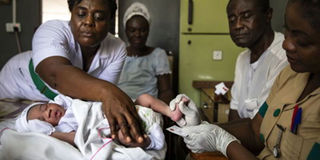Is sickle cell forgotten amid Covid-19?

What you need to know:
- Many marriages too are either on the rocks or are crumbling due the stigma associated with this disease, 20 per cent of all adult Ugandans are carrying the genetic trait - that is to say two out of every 10 Ugandans
June 19 was is the World Sickle cell Day, a day when we commemorate those who are sick with this disease, their caretakers, the doctors and nurses who treat them and the policy makers who care, treat and fight the disease and the public that should be aware. Sickle cell disease (SCD) is an inherited blood disorder (a blood disorder that runs in families). People with SCD produce an abnormal type of hemoglobin (called hemoglobin (HbS) or Sickle hemoglobin). Hemoglobin is a protein in red blood cells that carry oxygen from the lungs to the organs and tissues of the body.
The abnormal hemoglobin in SCD can cause the red blood cells to have a sickle or banana shape under certain conditions. People with SCD always have a decreased number of red blood cells, a condition called anaemia, which can cause a lack of energy, breathlessness, and a pale colour of the skin and lips.
While normal red blood cells are round like a donut and move freely through blood vessels, sickled blood cells clog the flow of blood and can break apart as they move through blood vessels. In addition, sickled red blood cells do not deliver oxygen throughout the body like normal red blood cells do. As a result, people living with sickle cell disease may suffer with severe pain, low number of red blood cells (anemia) organ damage and stroke.
The SDC Day is an important day for all because whereas SCD is an old disease that has been around for a long time, there is still so much mystery surrounding the disease that makes care, treatment and elimination that much difficult.About 20,000 babies in Uganda are born with this disease every year and more than 70 per cent of them die before the age of five. This is because many are ignorant of the disease and may seek start seeking treatment when it is late, or may go to witchdoctors and traditional healers for treatment.
Many marriages too are either on the rocks or are crumbling due the stigma associated with this disease, 20 per cent of all adult Ugandans are carrying the genetic trait - that is to say two out of every 10 Ugandans.
SDC carriers are getting married and do not only pass on the disease to their children, but they also spark domestic violence as a result, leading to the destruction of the family and the lack of care of the sick.
All these could be curtailed if more attention is paid to sensitisation and the creation of more awareness through communities, schools, churches, cultural and government leaders. The Kingdom of Buganda has been the sole champion of creating awareness and provision of equipment towards this cause.
Treatment of a sickle cell patient is very critical if the patient is to live to adulthood. There are a number of innovations in the treatment of sickle cell disease that has been discovered like bone marrow transplant. It is important to note that sickle cell disease can only occur when both partners carry the gene, it can never happen when only one partner has the trait.
Basil Ameny,
[email protected]




